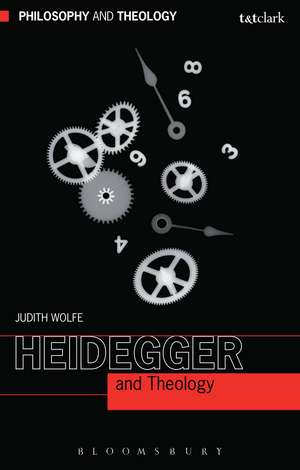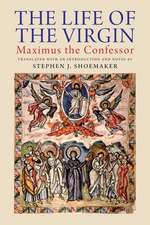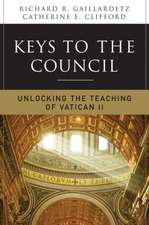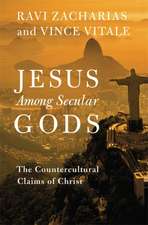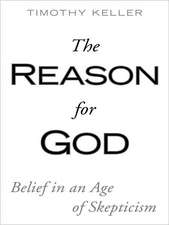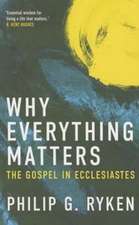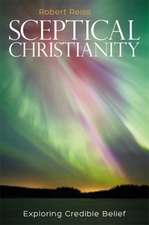Heidegger and Theology: Philosophy and Theology
Autor Judith Wolfeen Limba Engleză Paperback – 18 iun 2014
| Toate formatele și edițiile | Preț | Express |
|---|---|---|
| Paperback (1) | 177.84 lei 6-8 săpt. | |
| Bloomsbury Publishing – 18 iun 2014 | 177.84 lei 6-8 săpt. | |
| Hardback (1) | 538.36 lei 6-8 săpt. | +107.63 lei 4-10 zile |
| Bloomsbury Publishing – 18 iun 2014 | 538.36 lei 6-8 săpt. | +107.63 lei 4-10 zile |
Din seria Philosophy and Theology
- 14%
 Preț: 178.40 lei
Preț: 178.40 lei - 23%
 Preț: 178.22 lei
Preț: 178.22 lei - 23%
 Preț: 177.77 lei
Preț: 177.77 lei - 11%
 Preț: 217.09 lei
Preț: 217.09 lei - 23%
 Preț: 153.16 lei
Preț: 153.16 lei - 14%
 Preț: 163.08 lei
Preț: 163.08 lei - 22%
 Preț: 595.90 lei
Preț: 595.90 lei - 8%
 Preț: 158.64 lei
Preț: 158.64 lei - 14%
 Preț: 164.13 lei
Preț: 164.13 lei - 12%
 Preț: 215.69 lei
Preț: 215.69 lei - 12%
 Preț: 214.52 lei
Preț: 214.52 lei - 14%
 Preț: 189.61 lei
Preț: 189.61 lei - 14%
 Preț: 163.78 lei
Preț: 163.78 lei - 14%
 Preț: 165.03 lei
Preț: 165.03 lei - 14%
 Preț: 165.10 lei
Preț: 165.10 lei - 14%
 Preț: 165.03 lei
Preț: 165.03 lei - 22%
 Preț: 594.77 lei
Preț: 594.77 lei - 14%
 Preț: 165.48 lei
Preț: 165.48 lei - 14%
 Preț: 176.44 lei
Preț: 176.44 lei - 14%
 Preț: 175.98 lei
Preț: 175.98 lei - 14%
 Preț: 172.27 lei
Preț: 172.27 lei - 13%
 Preț: 180.61 lei
Preț: 180.61 lei - 14%
 Preț: 179.00 lei
Preț: 179.00 lei - 22%
 Preț: 568.40 lei
Preț: 568.40 lei
Preț: 177.84 lei
Preț vechi: 199.05 lei
-11% Nou
Puncte Express: 267
Preț estimativ în valută:
34.03€ • 35.53$ • 28.10£
34.03€ • 35.53$ • 28.10£
Carte tipărită la comandă
Livrare economică 15-29 aprilie
Preluare comenzi: 021 569.72.76
Specificații
ISBN-13: 9780567033765
ISBN-10: 0567033767
Pagini: 256
Dimensiuni: 138 x 216 x 20 mm
Greutate: 0.3 kg
Editura: Bloomsbury Publishing
Colecția T&T Clark
Seria Philosophy and Theology
Locul publicării:London, United Kingdom
ISBN-10: 0567033767
Pagini: 256
Dimensiuni: 138 x 216 x 20 mm
Greutate: 0.3 kg
Editura: Bloomsbury Publishing
Colecția T&T Clark
Seria Philosophy and Theology
Locul publicării:London, United Kingdom
Caracteristici
An intersection between theology and philosophy students provides a large readership
Notă biografică
Dr Judith Wolfe is a Lecturer in Theology at the University of St Andrews, UK
Cuprins
Note on the text Abbreviations Introduction 1 Heidegger ' s Catholicism (1889 - 1915) 2 Heidegger ' s Protestantism (1916 - 1921) 3 The emancipation of philosophy (1921 - 1929) 4 Theology in Being and Time 5 Heidegger between Hitler and Hölderlin (1930 - 1935) 6 The later Heidegger (1935 and beyond) 7 Heidegger among theologians 8 Heidegger in theology Bibliography Index
Recenzii
Heidegger and Theology is aimed at 'students of theology who would like to know more about Heidegger' and 'students of Heidegger first encountering his engagement with theology'. Many other readers appreciate the precision with which Wolfe teases out the complex and interrelated biographical and intellectual dimensions of Heidgger's life and work.
This latest addition to T&T Clark's excellent Philosophy and Theology series is very welcome. Judith Wolfe acknowledges that Heidegger's language is notoriously difficult to translate - and, we might add, to understand. But she brings admirable clarity to the task she has set herself, i.e. to introduce students of theology to Heidegger, and students of Heidegger to his engagement with theology.
When a slim, winsomely-written introductory volume manages accessibly to survey many of the most important signposts across Heidegger's path, does so in a way that both excavates new sources and puts them to constructive use, is historically-informed but futurally-minded and generous but critical -- that's an achievement . Heidegger's theologically-minded readership is bound to find this boon of resources exciting.
[A] strikingly erudite, meticulously researched, and penetrating book ... I highly recommend it, especially for theologians ambivalent to Heidegger.
The most helpful thing on Heidegger I've come across. Lucid, illuminating and comprehensive, it traces Heidegger's changing relationship to theology over the course of his life, and concludes with an overview of 20th and 21st century theological responses to Heidegger. Wolfe brings to bear both an immersion in the source material, some of it newly available and not yet translated, and an unusual clarity of mind. The result is a book which will be useful to both theologians and philosophers, and to students and advanced scholars alike. It is a pleasure to read.
This is the best kind of introduction: drawing on substantial scholarship in an accessible manner, and organized around a theme - the eschatological dimension of Heidegger's thought - that illuminates every phase of its subject's intellectual career as well as revealing one aspect of its underlying unity.
Judith Wolfe's indispensible new book is a superb tour d'horizon of the terrain - biographical, philosophical, and theological - on which future work on the vexed topic of Heidegger and theology may be carried out.
This is a groundbreaking book and a work of exceptional scholarship whose clarity of exposition exposes more than one widely-current obfuscation.
...it is not an overstatement to say that it is already one of the best books on the subject. Not only does it provide a thorough introduction to the question of Heidegger's relation to theology, but it does so with scholarly rigor and linguistic clarity. It is hard to see how, after Wolfe's research, one could dismiss the importance of theology both as an influence on and an interlocutor with Heidegger.
In this lively and readable book, theologian Judith Wolfe provides a helpful overview of the role of religion in philosopher Martin Heidegger's life, the major themes in his philosophy, and the history of the reception of his work in theology and philosophy of religion. Wolfe sheds fresh light on Heidegger's relationship to the theologians of his day.
Wolfe takes us through an impressively large number of Heidegger's writings, which she manages to distill with enviable clarity and without renouncing the nuance proper to a thinker of this magnitude.
This latest addition to T&T Clark's excellent Philosophy and Theology series is very welcome. Judith Wolfe acknowledges that Heidegger's language is notoriously difficult to translate - and, we might add, to understand. But she brings admirable clarity to the task she has set herself, i.e. to introduce students of theology to Heidegger, and students of Heidegger to his engagement with theology.
When a slim, winsomely-written introductory volume manages accessibly to survey many of the most important signposts across Heidegger's path, does so in a way that both excavates new sources and puts them to constructive use, is historically-informed but futurally-minded and generous but critical -- that's an achievement . Heidegger's theologically-minded readership is bound to find this boon of resources exciting.
[A] strikingly erudite, meticulously researched, and penetrating book ... I highly recommend it, especially for theologians ambivalent to Heidegger.
The most helpful thing on Heidegger I've come across. Lucid, illuminating and comprehensive, it traces Heidegger's changing relationship to theology over the course of his life, and concludes with an overview of 20th and 21st century theological responses to Heidegger. Wolfe brings to bear both an immersion in the source material, some of it newly available and not yet translated, and an unusual clarity of mind. The result is a book which will be useful to both theologians and philosophers, and to students and advanced scholars alike. It is a pleasure to read.
This is the best kind of introduction: drawing on substantial scholarship in an accessible manner, and organized around a theme - the eschatological dimension of Heidegger's thought - that illuminates every phase of its subject's intellectual career as well as revealing one aspect of its underlying unity.
Judith Wolfe's indispensible new book is a superb tour d'horizon of the terrain - biographical, philosophical, and theological - on which future work on the vexed topic of Heidegger and theology may be carried out.
This is a groundbreaking book and a work of exceptional scholarship whose clarity of exposition exposes more than one widely-current obfuscation.
...it is not an overstatement to say that it is already one of the best books on the subject. Not only does it provide a thorough introduction to the question of Heidegger's relation to theology, but it does so with scholarly rigor and linguistic clarity. It is hard to see how, after Wolfe's research, one could dismiss the importance of theology both as an influence on and an interlocutor with Heidegger.
In this lively and readable book, theologian Judith Wolfe provides a helpful overview of the role of religion in philosopher Martin Heidegger's life, the major themes in his philosophy, and the history of the reception of his work in theology and philosophy of religion. Wolfe sheds fresh light on Heidegger's relationship to the theologians of his day.
Wolfe takes us through an impressively large number of Heidegger's writings, which she manages to distill with enviable clarity and without renouncing the nuance proper to a thinker of this magnitude.
Descriere
Martin Heidegger is arguably the most important philosopher of the twentieth century for theologians, and the question of the nature of his relationship with theology remains a source of lively discussion. This book offers theologians and philosophers alike a clear account of the directions and the potential of this debate.
